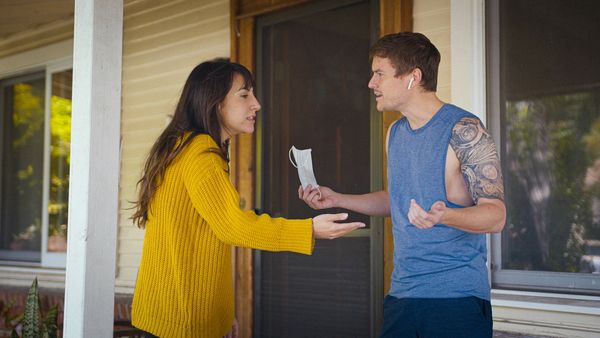Eye For Film >> Movies >> The End Of Us (2021) Film Review
The End Of Us
Reviewed by: Jennie Kermode

Over this past year a lot of relationships have come under pressure as a result of people being confined together under lockdown conditions. This has led to some ugly situations, but even when those involved are lovely people and want the nest for each other, it can be tough. Steven Kanter and Henry Loevner's quirky indie comedy, which screened at South by Southwest, is among the first films to address this subject, and whilst some viewers will feel that it's too soon, others will doubtless jump at the chance to see experiences like their own reflected onscreen.
Nick (Ben Coleman) and Leah (Ali Vingiano) have been living together for four years. Leah wants to feel that she's going somewhere in life, however, and Nick is patently not. Like the hero of Lim Jung-eun's Our Midnight, also out this year, he's engaged in the long, slow game of trying to make it as an actor, and not having much success. In the meantime he's working in a bar but bringing home very little, and she's sick of having to support him. They're both so caught up in their domestic drama that neither of them pays much attention to news reports about a strange virus taking hold on the other side of the country. When Leah finally reaches breaking point and declares that t's over, she feels sorrow but also tremendous relief. Then she sets out for work the next day and the streets are empty. She calls a friend who gently explains the situation.
With everybody hunkering down for lockdown and jealous of their space, Nick has nowhere to go - at least nowhere that he considers acceptable - so he and Leah decide to try and make the best of things and continue to share the space where they were once happy together. This is complicated by the fact that Nick is still hoping to win her back, even as both begin to engage in online flirtation with other people and Leah takes the first steps into a new relationship. There's little knowledge about the virus in their social circles so they alternate between assuming they're about to die and taking really stupid, unnecessary risks, something that could easily become annoying but is almost endearing in this childlike pair.
It's important to accept from the outset that Nick and Leah have had it pretty easy in life and have no real idea what it means to struggle. The house in which they find themselves trapped is actually pretty spacious, with a porch and a garden and pleasant views, and they can easily leave it and drive out into the countryside or walk to a local park without significant risk. They're both young and healthy and their social lives continue pretty much uninterrupted in virtual form. They don't face much real deprivation, but what is significant is how this compares to what they've known before. Both are frightened, which forces them to be honest with each other to a degree that seems to be new. As a result they discover a new kind of closeness, even as Leah struggles to cope with Nick remaining in her space.
Though irritatingly mannered in places, for the most part the script flows naturally, with the writer/director team trusting the actors to bring out its tensions and explore its emotional depths without the need for any more urgent driving factors. There are just enough events to keep things interesting without distracting from the fact that it's really the sameness of things that is behind the character interactions we see. There is no need for malice for the situation to feel unbearable, nor for the conventions of romance to make it sweet. Given enough space, it finds its own way.
Reviewed on: 24 Mar 2021














